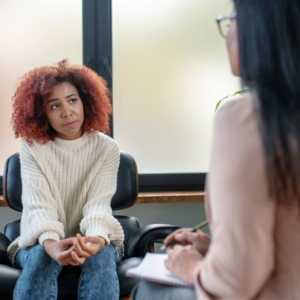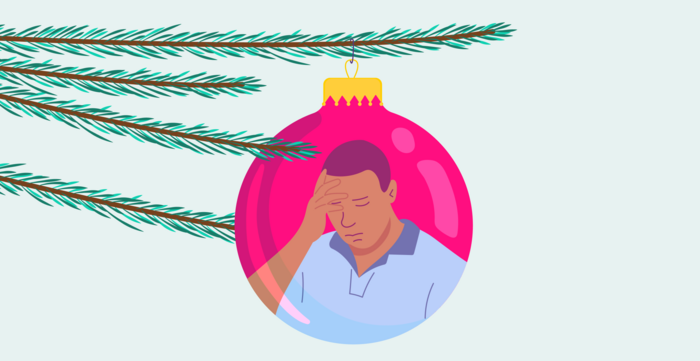Managing Mental Health During the Holidays
The holidays are framed as the most wonderful time of year, yet this season can also come loaded with stressors. This year, many families are preparing to gather with loved ones after months or even years of separation due to the pandemic. While this can be a cause for celebration and connection, it can also unearth a slew of emotional and mental health challenges.
As you gear up for holiday plans, you may be worried about everything from managing tricky family dynamics, to how to pay for holiday travel and gifts, to fielding questions about your personal life from loved ones. Some are worried about how to approach differences in values on issues like politics or COVID-19 precautions and vaccination status. Meanwhile, others are dealing with burnout from work and considering how to maximize time off, for those who are able to take time away.
Then there are logistical stressors of the holiday season, like travel and COVID-19 precautions in light of the Omicron variant. Family responsibilities like cooking, cleaning and gift-giving can add to the load — particularly given that women are more likely to shoulder household caregiving responsibilities, according to the Kaiser Family Foundation.
For others, this holiday season marks the first time that families who have lost parents, siblings, relatives and friends during the pandemic are able to gather together and grieve. Nearly 800,000 Americans have died from COVID-19, according to The New York Times, and a loved one’s absence may feel particularly pronounced during this time of year.
If you’re experiencing any of these feelings, know that you’re not alone. More than 1 in 3 Americans reported that their stress worsens over the holiday season, according to the American Psychological Association.
Symptoms to watch for
Holiday stress can cause emotions such as irritability, fatigue and anger, according to the American Psychological Association. It can also manifest as anxiety, sadness, headaches, body aches or inability to sleep, according to Healthline.
On top of holiday stressors, roughly 10 million Americans also experience seasonal-affective disorder during this time of year, according to Boston University. This type of depression, which relates to the change in seasons, is four times as likely to affect women compared to men.
There are concrete steps you can take to help manage mental health symptoms during the holidays. Read on for key tips and takeaways on different ways to help support yourself and loved ones.
Strategies for managing mental health
Make time for yourself and practice your routine
The holidays are often packed to the brim with activities, people and parties. You might feel a sense of obligation to make time for others whenever possible, but some experts suggest considering working in alone time to take space and reset, according to the Seattle Times.
That could look like taking a walk outside, getting some sunshine, exercising, running errands or taking a drive alone. Think about the rhythms of your routine that typically help you stay grounded and practice those as much as possible, even if you’re in a different environment, says Dr. Goebel, a psychiatrist at Ogden Regional Medical Center in an article sourced by ABC4.com.
Plan ahead for what you can, but accept situations beyond your control
It can be helpful to think ahead and anticipate situations you might encounter to create a game plan, according to the Seattle Times.
For example, if you’re concerned about finances, talk with family members about how to stay within a budget or make accommodations that work for you and your family. Set parameters in advance if you plan to exchange gifts. For those who are anxious about food or exercise habits during the holidays, consider cooking and bringing a celebratory dish that you’re excited to eat, according to the Seattle Times.
At the same time, it’s important to accept circumstances you can’t control, suggests Mark Debus, a behavioral health services expert writing for Fast Company. Mr. Debus recommends that you try to use the tools at your disposal to manage rumination and anxiety as best you can leading up to the holidays so that you don’t enter a situation expecting conflict that might not unfold.
Say no: sit out when you need to
The holiday season can create pressure to do everything, particularly with less COVID-19 risk compared to last year. However, practice the art of saying no — and honor your instincts! When your social energy feels depleted or you think that attending a particular event won’t be productive for you or a loved one’s mental health, feel empowered to pass on it, suggest experts in the Seattle Times.
Communicate boundaries with family and employers
Ask your employer clearly when you are or aren’t expected to be reachable and working. Set realistic expectations with yourself and colleagues about what you can accomplish, according to Mr. Debus. If you have agreed to take time off, do your best to unplug. When it comes to family discussions, meanwhile, be clear about which subjects you aren’t comfortable discussing and don’t hesitate to vocalize which questions or conversations are out of bounds.
Be kind to yourself
Holiday gatherings are a time when many people field questions about personal matters like work, finances or their relationship status — especially from relatives you haven’t seen in years. You may feel under scrutiny, or like you need to have it all together. Remember that you’re doing your best, and that everyone has different emotional bandwidth at this time. Try to extend the same grace you’d give to others toward yourself.
Grieve loved ones who are gone
Perhaps this is the first time you’re in person with family or friends to mourn the people who were lost during the pandemic. Rather than feeling pressure to put on a smile or facade, take this time to honor those you’re missing in whatever way feels authentic to you and your family, recommend Dr. Orleck, a psychologist based in North Seattle.
Seek support and resources
If you’re experiencing symptoms of anxiety or depression, consider seeking help from a licensed therapist, counselor or mental health professional. If you’re already seeing a therapist, staying regular with sessions could be one way to work through holiday stressors as they crop up, writes Mr. Debus in Fast Company.
Groups like PFLAG, an organization that supports LGTBQ+ people, parents and allies, provide guidance for managing conversations around sexual orientation and gender identity during the holidays. For people who have or are recovering from substance use disorder, different resources provide tips to help navigate the holidays sober.
Above all, remember that you’re not alone in the challenges you’re experiencing and that you can find tools to help manage them.
How Solv Can Help With Mental Health
Connecting to an Urgent Care facility when appropriate can be a useful first step for people struggling with their mental health during the holidays. Speaking with a provider can help you begin to address current symptoms. Providers can lend a listening ear to discuss possible next steps for your long-term mental health care plan, as needed. Providers also can discuss referrals or direct people facing immediate crises to the emergency room. For more information on how urgent care can play a role in mental health concerns, read on here.
FAQs
Why can the holiday season be stressful?
The holiday season can be stressful due to family dynamics, financial pressures, and concerns about COVID-19, among other factors.
What are some symptoms of holiday stress?
Symptoms can include irritability, fatigue, anger, anxiety, sadness, headaches, body aches, or problems with sleep.
How can I manage my mental health during the holidays?
You can manage your mental health by practicing self-care, planning ahead, setting boundaries, allowing yourself to grieve losses, and seeking professional help if needed.
Can Urgent Care facilities help with mental health issues?
Yes, Urgent Care facilities can provide initial support for individuals struggling with their mental health, including discussing symptoms and possible next steps for long-term care.
What resources are available for managing conversations around sensitive topics during the holidays?
Organizations like PFLAG offer guidance for managing conversations around topics like sexual orientation and gender identity, and there are resources available for those navigating the holidays while in recovery from substance use disorder.
How can I handle the pressure of attending every holiday event?
The holiday season can create pressure to attend every event, but it's important to practice the art of saying no. If your social energy feels depleted or you think that attending a particular event won't be beneficial for your mental health, feel empowered to pass on it.
What can I do if I'm grieving a loved one during the holidays?
If you're grieving a loved one during the holidays, take time to honor those you're missing in a way that feels authentic to you and your family. There's no need to put on a facade or mask your feelings.
How can urgent care facilities help with mental health concerns during the holidays?
Urgent care facilities can be a useful first step for people struggling with their mental health during the holidays. Providers can lend a listening ear, discuss possible next steps for your long-term mental health care plan, and provide referrals or direct people facing immediate crises to the emergency room.



